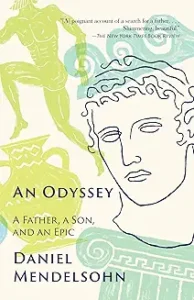An Odyssey: A Father, a Son, and an Epic by Daniel Mendelsohn 2017
This is a wonderful book in so many ways. It’s a retelling of the Homeric poem, all 12,110 lines of Greek dactylic hexameter in a colorful and engaging manner. It’s not quite the Cliff’s Notes version but Mendelson provides a simpler and less detailed summary of the highpoints. With its emphasis on sequence and themes, he provides a focused way of absorbing the story. It’s also a touching and thought-provoking exploration of the father/son relationship between the author and his 81 year old father, Jay. Whether it’s Odysseus and his son Telemachus and his own father, Laertes or whether it’s Mendelsohn and his two young sons and his father, this detailed and multi-dimensional exploration of what it means to be both a son and a father is both unsettling and touching. In addition, the book is a critical exploration of the themes of the Odyssey— questions of identity/anonymity, disguise/recognition, journey/arrival, narration/story, truth-telling/dissembling, and again and again, fathers/sons.
The book proceeds with two parallel story lines. First, there is Classics 125, the course on the Odyssey that Daniel Mendelsohn teaches at Bard. His aging father, asks to sit in on the seminar, thus providing the author with the outline for relating the epic’s story, themes, language, and above all, the story of the trickster, the hero, the recipient of Athena’s beneficence and Poseidon’s anger, Odysseus. The insightful questons and answers provided by the Bard students in the seminar enrich Mendelsohn’s analysis of the epic poem.
A second story line is the relationship between Daniel and his father, a stern, driven, precise, and emotionally distant mathematician, told with flashbacks to his childhood and through the description of the cruise they took to retrace the travels of Odysseus as he tried to return to Ithaca after the end of the Trojan War. The cruise beginning in the modern site of Troy which had been destroyed in 1200 BCE and the planned ending in Ithaca provides another vehicle for analyzing the epic poem.
Having read the ‘Odyssey’ a couple of years ago, I enjoyed revisiting Circe, Polyphemus, Calypso, Scylla and Charybdis and especially the return of Odysseus to Ithaca and his confrontation with the suitors, but my real enjoyment came from Mendelson’s brilliant analysis, exploration, and deep dive into the relationship with his own father and how it paralleled and differed from the Telemachus/Odysseus/Laertes relationships in the poem.
In a wonderful parallel to the poem, after Jay Mendelsohn dies, Daniel seeks out Jay’s older brother, Howard, and his best friend, Nino, to try to learn more about his father’s own childhood and his life outside the family. This is the way the ‘Odyssey’ begins as Telemachus visits the aging Nestor and Agammemnon at the beginning of the epic poem to learn of his father’s exploits and whereabouts. Both Telemachus and Daniel learn from these different viewpoints of events that the truth is rarely straightforward. When the 52 year old Mendelsohn visits Howard and Nino, new and suprising information results in a more sympathetic and nuanced view of his father and the realization that a son can never know his father as fully as the father knows the son.
Reading this book rekindled my own regrets at not knowing my own father better—his childhood, his working years, his inner life, his triumphs and losses. And now that it’s too late, the question is what can I do so that my own children aren’t left with those same feelings down the road.
I’ve read two of Mendelsohn’s collections of lit crit essays as well as his award-winning book about his family and the Holocaust, “The Lost”, and he’s an exceptional writer and thinker as is evident in both the title and last lines of this book. The title, ‘An Odyssey’, cleverly melds the various story lines of the book by linking two journeys, the literal one on the cruise ship and the figurative one in the exploration of their relationship that he and his father will undertake through the epic poem. The final line, moreover, is the brilliant culmination of the whole book. Spoiler alert is not necessary since we already know the outcome of his father’s terminal stroke, so when his sister-in-law calls from the hospital to let Daniel know that his father has died, she tells the just awakened Daniel, “It’s your father.” And it certainly is for all of us.



